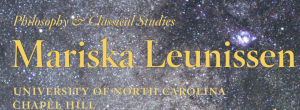Presented By: Department of Philosophy
Ancient Philosophy: Mariska Leunissen (UNC Chapel Hill)
The Function(s) of the City-Animal Analogy in Aristotle's Politics

Aristotle’s political naturalism, as introduced in the first book of his Politics, rests on three claims about the relation between nature and the city-state: first, that the city exists by nature; second, that human beings are by nature more political than any other political animal; and third, that the city as a whole is naturally prior to the household and the individual. He argues for this latter claim by treating the city as analogous to the natural, organic body of a human being: since natural wholes such human bodies are prior to parts and since their parts can no longer perform their function when separated from the functionally complex whole to which they belong, the same must be true for cities and their parts. And while Aristotle seems to resist the view that cities are themselves natural substances (ultimately, cities that exist for the sake of living well are the product of the art of lawgiving), he frequently naturalizes the city and resorts to analogies between cities and human/animal bodies in order to draw out and explain important features about the city or its constitution, which he designates as ‘a kind of life of the city’. My purpose in this paper to specify the heuristic and explanatory uses of these analogies between cities and natural, living bodies. I will first discuss a few relatively innocent uses of this kind of analogy before attempting to offer an interpretation of a more complicated passage in Politics IV 4 in which Aristotle suggests that one can determine the species of cities in exactly the same way as one would compile a complete list of species of animals.